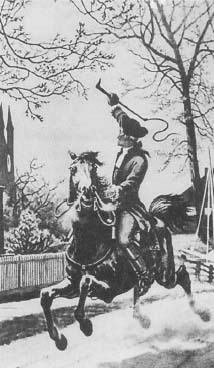Paul Revere Court-Martial: 1782
Initial Allegations Against Revere
The charges brought against Paul Revere were a consequence of the confusing events that ended this ignominious expedition. The major blame for the disaster lay clearly with Commodore Saltonstall, and he was court-martialled and dismissed from the service. Other factors at work, how-ever, resulted in the charges against Revere. There was bad feeling and rivalry between the different branches of the military forces—friction and argument between the naval command and the artillery and marines. In his diary Revere commented on the undisciplined nature of his forces—raw recruits, old men and boys, undisciplined and difficult to work with. There was also personal animosity between Revere and certain other officers with whom he had clashed while commanding the garrison at Castle Island.
As soon as he returned overland to Boston, Revere attempted to resume command of his garrison, but was asked to resign and await the results of an inquiry into the Penobscot expedition to be conducted by a committee of the Massachusetts General Court. Captain Thomas Jenners Carnes, who had commanded the marines on board the General Putnam, charged Revere with disobedience, unsoldierlike behavior, and
 Paul Revere on his legendary 'midnight ride."
Paul Revere on his legendary 'midnight ride."
Revere conducted his own defense before the inquiry very vigorously, depicting the charges as motivated only by a desire for personal revenge, and bringing several officers to testify that he was a diligent officer. In support of this he introduced as part of his deposition sections of the diary he had kept throughout the operation. However, he had a relatively weak defense against the specific charges of insubordination.
The report of the inquiry came out on October 7. It found that the principal reason for the disaster was "the want of proper spirit and energy on the part of the Commodore;" the inquiry recommended a court-martial, and it was quickly done, resulting in his dismissal from the service on October 25. Revere, however, was extremely distressed to find that the report made no mention whatever of his activities or the charges made against him. Anxious to vindicate himself and insisting that it was unsatisfactory to be neither condemned nor acquitted, he asked for a court-martial under the direction of an artillery officer. He was to file six such petitions before getting his wish. In response to his petition, a second committee of inquiry met in November 1779, but Revere was even more dissatisfied with its report. The committee criticized his conduct, though in rather ambiguous terms, declaring him to have been blameworthy for "disputing the orders of Brigadier-General Wadsworth" and holding that his leaving the Penobscot River with his men without specific orders to do so was "not wholly justifiable."
Additional topics
- Paul Revere Court-Martial: 1782 - Revere Court-martialled At His Own Insistence
- Paul Revere Court-Martial: 1782 - The Penobscot Expedition
- Other Free Encyclopedias
Law Library - American Law and Legal InformationNotable Trials and Court Cases - 1637 to 1832Paul Revere Court-Martial: 1782 - The Penobscot Expedition, Initial Allegations Against Revere, Revere Court-martialled At His Own Insistence